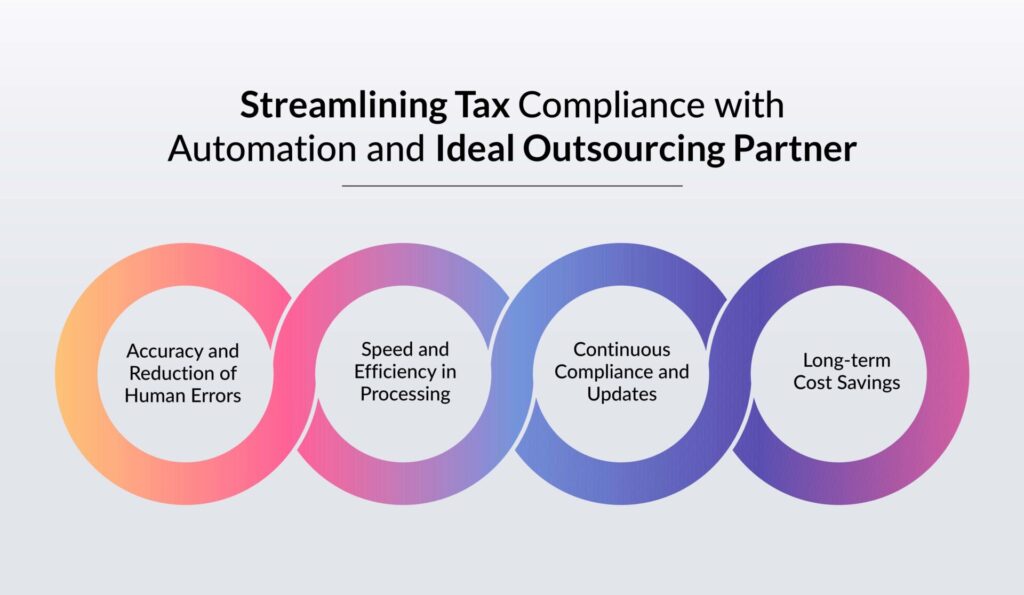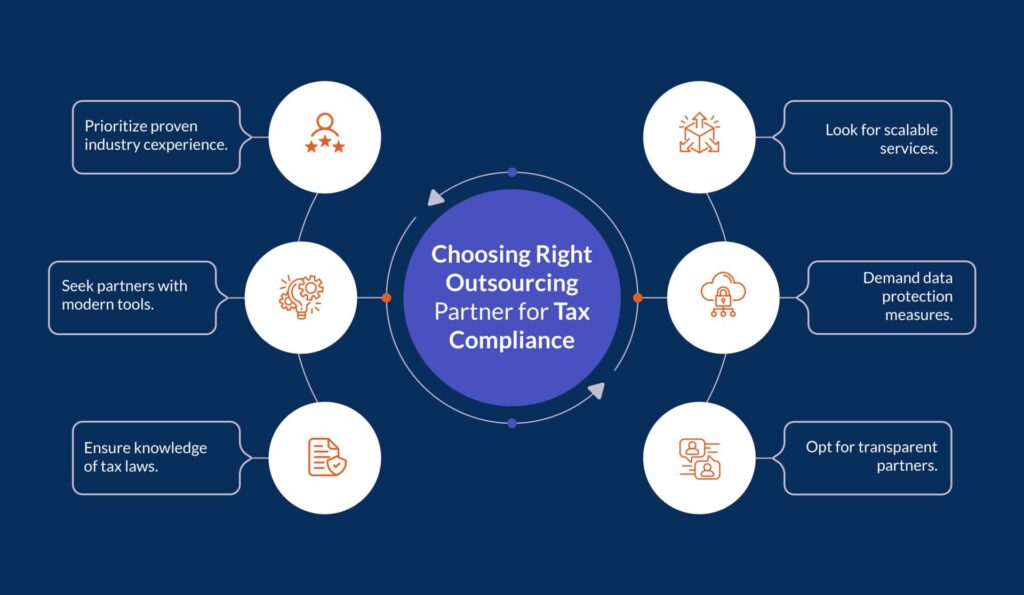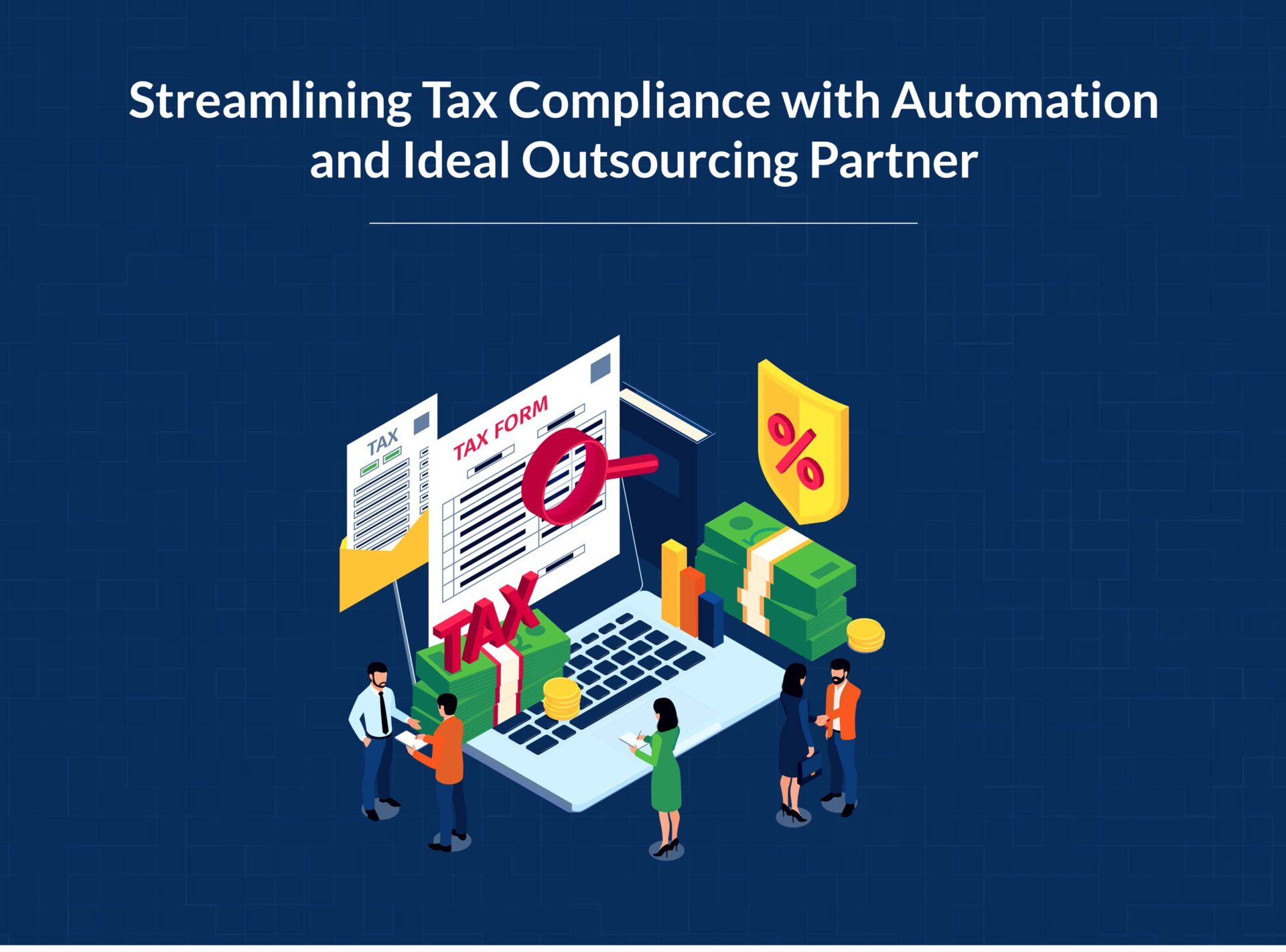In today’s tricky tax world, businesses struggle to keep up. We’re showcasing two solutions: Automation and Outsourcing. Modern taxes can be confusing and spread across many places. Automation makes data handling easier and more accurate and outsourcing to expert accountants saves time and offers special know-how.
This blog dives into how these two solutions work together to make tax tasks simpler. Keep reading to understand their perks and what to seek in an outsourcing partner.
The Evolving Landscape of Tax Compliance
Overview of Historical Tax Landscape
Taxes have always been part of society’s backbone. From ancient times, where taxes were paid using crops or services, to our current system with income and business taxes, it’s clear that taxes have come a long way.
Modern Challenges in Tax Compliance
Businesses today wrestle with a tricky tax landscape. With complex laws that keep changing and the challenges of global operations, it’s crucial to stay informed. Slipping up? That could mean fines, legal troubles, and a dent in your reputation!
Importance of Keeping Up with Ever-Changing Tax Laws and Regulations
It’s important for businesses to keep up with tax changes. By understanding and following tax rules, businesses stay on solid financial ground and avoid legal issues. Plus, being transparent about taxes helps build trust with both the public and government.
In this blog, we’ll delve deeper into the modern tax compliance landscape, exploring strategies to navigate its complexities successfully.
The Rise of Automation in Tax Compliance
What is Automation in the Context of Tax Compliance?
Automation in tax compliance refers to the integration of technology-driven tools and software solutions to streamline and simplify the process of meeting tax obligations. This includes automating data collection, calculations, reporting, and compliance checks, reducing the manual workload involved in tax-related tasks.

Key Benefits of Tax Automation:
- Accuracy and Reduction of Human Errors: By using automation, the chance of making mistakes with tax calculations or entering data goes down. This helps save money on potential fines.
- Speed and Efficiency in Processing: Automated systems can go through tons of data super-fast, making the tax process quicker and less of a headache.
- Compliance Checks and Instant Updates: These tools always keep an eye on the latest tax rules. So, businesses can easily adjust to new tax changes without missing a beat.
- Cost-Saving Over Time: Even though setting it up might cost a bit, over time, automation saves money. Fewer mistakes mean fewer fines and doing things faster means saving time and money.
The Role of Outsourcing in Modern Tax Compliance
In today’s dynamic business landscape, outsourcing has emerged as a strategic approach to managing non-core functions efficiently. When it comes to tax compliance, outsourcing plays a pivotal role, offering businesses a range of benefits.
- Strategic Value of Outsourcing Non-Core Business Functions
By letting outside experts handle things like tax stuff, businesses can put all their energy into what they do best. It frees up valuable time, resources, and personnel to concentrate on strategic initiatives, driving growth and innovation.
- Outsourcing as a Solution for Businesses Without In-House Tax Expertise
Not every business has a tax expert on their team or the tools to handle tricky tax matters. Outsourcing is like hiring a tax pro just when you need them, making sure all tax issues are sorted without a hitch.
Benefits of Outsourcing Tax Compliance

- Expertise On Hand: Outsourcing means you’re getting pros who know the latest in tax rules. This ensures your tax paperwork is spot on, helping to avoid pricey mistakes.
- Flexible to Your Needs: With outsourcing, businesses can easily adjust how much tax help they get, be it during busy tax seasons or when venturing into new areas.
- Save Money on Staffing: Having a full-time tax team can get costly, from salaries to training. By outsourcing, you only pay for what you need, saving you a bunch.
- Avoiding Tax Trouble: Mistakes in taxes can be harmful, both in fines and bad publicity. Outsourcing teams are all about keeping you in line with tax rules, so risks are minimized.
In summary, outsourcing non-core business functions, such as tax compliance, offers strategic value by allowing businesses to focus on their core strengths. For companies lacking in-house tax expertise, outsourcing provides access to specialized knowledge, scalability, cost savings, and risk mitigation.
It’s a valuable tool in modern tax compliance, helping businesses navigate complex regulations while staying competitive and agile in today’s fast-paced business environment.
Combining Automation and Outsourcing: A Comprehensive Solution
In the realm of modern tax compliance, the marriage of automation tools and outsourcing can create a powerful synergy, offering businesses a comprehensive solution to their complex needs.
How Automation Tools Can Complement an Outsourced Team and Vice Versa
Think of automation tools as efficient machines and outsourced teams as the skilled human touch in the world of tax compliance.
- Automation for Routine Work: These tools speed things up by taking care of regular, repetitive tax tasks. They collect, process, and report data smoothly, leaving little room for basic errors.
- Outsourced Teams for Expert Insights: While machines are fast, you sometimes need a human’s understanding and touch, especially when tax laws get tricky or change. An outsourced team knows these ins and outs and can adjust to any curveballs thrown their way.
Together, you get a blend of speed and precision from automation, and the adaptable expertise from an outsourced team. It’s like having the best of both worlds working for your tax needs.
Achieving Synergy: Maximized Efficiency, Minimized Errors, and Enhanced Compliance
Imagine automation as a speedy, precise worker and the outsourced team as the experienced supervisor double-checking the work.
- Fast and Flawless with Automation: For the regular, data-heavy tasks, automation does the job quick and without hiccups.
- Human Touch with Outsourced Teams: Even with automation, you need real people to look over things, especially as tax rules often change. That’s where your outsourced experts come in. They double-check the automated work and make sure it aligns with current rules.
Together, they make a dream team – ensuring tax work is done right, on time, and in line with all regulations.
Customizing Solutions Based on the Unique Needs of Businesses
Every business is its own world, especially when it comes to taxes. Here’s where the mix of automation and outsourcing shines:
- Personalized Game Plan: With automation tools, businesses can handle tasks that need a quick and consistent touch. Meanwhile, for the more detailed and specific parts, the outsourced experts step in. This means businesses can shape their tax strategy just the way they need.
- Getting the Best of Both: Using both automation and an outsourced team together is like having a top chef and a state-of-the-art kitchen. They enhance each other’s strengths, ensuring tax tasks are done swiftly, correctly, and in line with the rules.
Wrapping up, blending automation and outsourcing is the answer to today’s tax challenges. This combo offers flexibility and precision, allowing businesses to tackle the maze of tax compliance confidently and smoothly.
Choosing the Right Outsourcing Partner
Selecting the ideal outsourcing accounting service company is a critical decision for businesses aiming to streamline their tax compliance processes. Here are key qualities to look for:

Qualities to Look for in an Ideal Outsourcing Accounting Service Company:
- Expertise and Experience: Seek a partner with a proven track record in tax compliance. Experience in your industry or specialization in your tax needs is a significant advantage.
- Technological Competence: In today’s digital age, a competent outsourcing partner should be technologically savvy. They should have state-of-the-art systems and tools, ensuring efficient and accurate tax processes.
- Compliance Knowledge: The partner must be well-versed in the latest tax laws and regulations. They should demonstrate a commitment to staying updated and ensuring your compliance.
- Flexibility and Scalability: A good partner can adapt to your business’s changing needs, whether you’re scaling up or down. They should offer flexibility in service packages.
- Data Security: Protecting your sensitive financial data is paramount. The partner should have robust security measures and compliance with data protection standards.
- Clear Communication: Effective communication is key to a successful partnership. Look for a partner who maintains open lines of communication, responds promptly, and keeps you informed.
The Importance of Technological Competence
Living in a digital world means knowing your tech is a must. For businesses looking at outsourcing, here’s why it matters:
- Efficiency & Accuracy: An outsourcing partner who is tech-savvy knows how to use automation and the latest software to make tax processes run smoother and with fewer mistakes.
- Staying Current: With technology, businesses can receive updates and reports as they happen. This helps keep pace with any changes in tax laws.
To sum it up, if you’re looking to outsource, pick a partner who’s sharp with technology. It’s a game-changer for top-notch tax compliance.
Preparing for the Future: Staying Ahead in Tax Compliance
In the world of taxes, change is the only constant. To stay ahead, businesses need to be on their toes. Here’s how they can do it:
1. Expect Change: Tax rules are always evolving. Just as the world changes, so do government needs and economic landscapes. It’s crucial for businesses to expect these changes and be ready to pivot when needed.
2. Stay Nimble & Think Ahead: Being flexible and having a plan is crucial. If businesses are always waiting to react, they’ll always be a step behind. By thinking ahead and being prepared to adjust strategies quickly, companies can not only stay compliant but even find ways to save money.
3. Keep Learning: The tax world is vast and intricate. Regular training for both internal teams and outsourced partners ensures everyone’s up to speed with the latest rules, tools, and strategies. This isn’t just about playing defense; it’s about leveraging knowledge for better outcomes.
4. Check and Double-Check: Regularly reviewing and auditing tax processes is like going to the doctor for a check-up. It helps catch any small issues before they become big problems. Keeping everything in check ensures accuracy and saves potential headaches down the line.
In conclusion, staying on top of tax compliance is all about anticipating change, staying adaptable, committing to continuous learning, and regularly checking your systems. With these steps, businesses can confidently tackle tax challenges today and in the future.
Conclusion:
In today’s fast-paced business landscape, leaning on automation and outsourcing isn’t just a smart move—it’s essential. Navigating the maze of tax compliance needs a fresh, modern approach. Here’s what we’ve learned:
Key Insights:
- Automation is like your trusty calculator, ensuring tasks get done quickly, correctly, and consistently.
- Outsourcing is like having a tax guru in your corner—someone who knows the nuances and can adapt to changes.
- When combined, these two form a dynamic duo, giving businesses a competitive edge in tax compliance.
- Handling taxes isn’t a “do it and forget it” thing. It’s an ongoing commitment.
- The tax world is always in motion. New rules. New challenges. New opportunities. Staying still isn’t an option.
- To thrive, businesses need to stay agile, invest in continuous learning, and always be ready to review and refine their processes.
- In this shifting financial arena, blending automation with outsourcing gives businesses the best toolkit to tackle tax tasks with confidence.
In essence, mastering tax compliance in our modern age is about staying proactive, leveraging the best tools and expertise, and always being prepared for what’s next. It’s a strategic journey towards enduring success.
If you enjoyed reading this article, be sure to explore our other blogs on Accounting, Tax, and Outsourcing!
Ready to optimize your operations? By outsourcing tax tasks, you can enjoy time savings, reduced errors, and expert guidance. Elevate your business with AcoBloom’s customized solutions, unlocking efficiency and precision in your financial strategies. Get in touch with us today to discover more.
